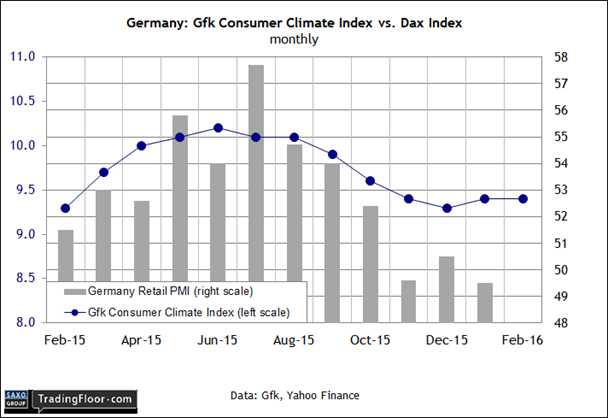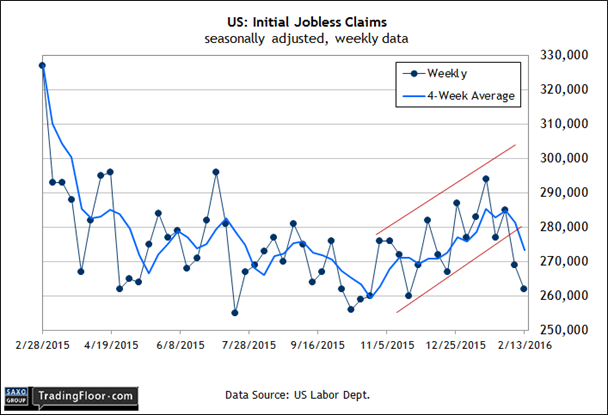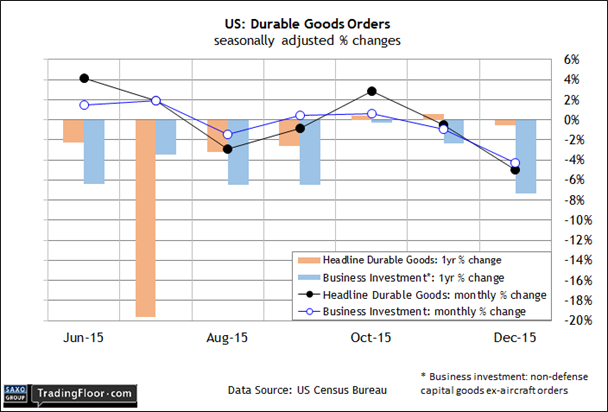Thursday’s a busy day for economic updates, including the Gfk Consumer Climate Index for Germany. Two key US reports are on tap as well: The weekly jobless claims data and the January numbers on new orders for durable goods.
Germany: Gfk Consumer Climate Index (0700 GMT) The numbers for Europe’s key economy have been looking a bit shaky lately. This week’s Ifo survey data for February, for instance, paints a gloomy profile of sentiment in the country’s business sector.
The consultancy’s business climate indicator dipped for the third time in a row to its lowest reading in over a year. The news follows last week’s soft ZEW data, which highlighted fading optimism among financial analysts in the country. There’s hard-data worries too via the second consecutive drop for Germany’s industrial output in December.
Today’s numbers from Gfk will offer a fresh look at how the consumer sector’s holding up at the moment. The rearview mirror shows a bit of deterioration in sentiment late last year, but signs of stabilisation emerged in 2016's first two monthly updates. Will we see more of the same in today’s update, which is billed as a forecast for March?
Econoday.com’s consensus forecast calls for a down-tick to 9.3 after 9.4 readings in each of the two previous months. The estimate for today implies that consumer sentiment has found a floor after dipping in 2015’s second half.
But some analysts are expecting trouble. After reading yesterday’s weak data in the Ifo report at least one dismal scientist concluded that the macro headwinds are strengthening.
“Global events have finally reached German companies’ boardrooms,” the chief economist at ING wrote in a note to clients yesterday. “All in all, today’s Ifo index sends a strong wake-up call to the German economy: the easy and carefree life on the island of happiness seems to come to an end.”
Meanwhile, Markit's sentiment data for Germany's retail sector dipped below the neutral 50.0 market again last month.
The optimistic spin is that weather temporarily depressed spending. Perhaps, then, we'll see a bounce in the next update of the Germany Retail PMI report that's due next week. But first, let's see how today's clue from Gfk stacks up.

US: Initial Jobless Claims (1330 GMT) The front line for optimism for the US economy is once again firmly centered on the government’s numbers on new filings for unemployment benefits.
Although the trend looked worrisome in December and January, claims reversed course in February, posting solid declines over the last two updates. The return to form suggests that recession risk remains low.
“Even though it gives us only one side of the labor-market ledger, jobless claims are effectively a gauge on overall business sentiment,” the deputy head of US research and strategy at TD Securities USA told Bloomberg last week.
The numbers offer “a good indication that businesses are more inclined to hold on to what they have and add to that, as opposed to reduce their payrolls.”
Economists think that today’s update will show a modestly higher level of claims for the week through February 20. Econoday.com’s survey data points to a rise of 8,000 to a seasonally adjusted 270,000 in today's release.
But that’s still close to last summer’s multi-decade low of 255,000. In fact, any number that's well below the previously rising channel - the lower red bar in the chart below - will suffice as a bullish reading for this data.

US: Durable Goods Orders (1330 GMT) This week’s flash data for US manufacturing activity in February adds another layer of worry for a sector that’s already weighed down by disappointing data. In fact, the latest decline in Markit’s purchasing managers’ index is especially worrisome because the latest dip marks a new leg down for what had been a comparatively upbeat indicator in an otherwise bearish field of manufacturing signals.
True, the PMI is still an outlier by virtue of its mildly positive reading - 51.0 in February, which is just above the neutral 50 mark that separates growth from contraction. The directional bias of late, however, is hard to ignore, which is to say that the latest decline leaves the PMI at its lowest level since late 2012.
“Every indicator from the flash PMI survey, from output, order books and exports to employment, inventories and prices, is flashing a warning light about the health of the manufacturing economy,” Markit’s chief economist said earlier this week.
Today’s update on new orders for durable goods, by contrast, is set to offer a refreshing change from the bearish numbers of late. Briefing.com advises that the headline change for orders will pop 2% in the monthly comparison for January, a dramatic turnaround from the previous month’s 5% slide. Even better, the projected gain will push the year-over-year trend in new orders back into the black via a modest 1.5% advance.
Assuming the forecast holds, is it a sign that worst is over for manufacturing? Perhaps, but it’ll take more than one upbeat report to convince the crowd as long as the PMI data continues to stumble.

Disclosure: Originally published at Saxo Bank TradingFloor.com
